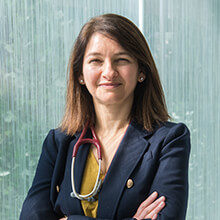Thanks to a transformational $5.6 million gift from the Paula and Rodger Riney Foundation, the Mass General Cancer Center is poised to break new ground in multiple myeloma research and improve the lives of thousands of individuals living with the disease. The gift establishes the Riney Family Multiple Myeloma Initiative at Mass General, which will support a team of experts in basic, translational and clinical research in their work to discover new treatments.
“As a 6+ year multiple myeloma survivor, my family and I personally understand the need to support the individuals, teams and organizations that are on the leading edge of research,” says Rodger Riney, co-founder of the Paula and Rodger Riney Foundation. “Mass General has an impressive track record in improving myeloma treatment, and we are honored to help accelerate their discoveries.”
New Strategies to Improve Care
Multiple myeloma is a cancer that affects plasma cells — a type of white blood cell. Just 20 years ago, treatment options for patients diagnosed with multiple myeloma were limited; today, extraordinary advances in diagnosis and care have drastically improved survival rates for individuals living with this difficult disease. But innovations can’t come quickly enough for the thousands of people diagnosed with multiple myeloma each year.
Paula and Rodger Riney established the Paula and Rodger Riney Foundation in 2017, two years after Rodger was diagnosed with multiple myeloma. The foundation has supported research teams across the country working to advance multiple myeloma research and care — a roster that now includes the Center for Multiple Myeloma at the Mass General Cancer Center.
“The Center for Multiple Myeloma has played a crucial role in translating new discoveries into treatments since its founding in 2005,” says Tim Graubert, MD, director of the Hematologic Malignancies Program. “It places patients at the center of a compassionate and caring environment while collaborating with other disciplines and institutions on research that will lead to new treatments.”
Supporting the Cycle of Discovery
Understanding the fundamental biology of multiple myeloma — what triggers the cancer at the molecular level and how it progresses — often reveals opportunities where treatments might slow, reverse or even prevent multiple myeloma.
Working with their colleagues in Mass General’s Center for Cancer Research, physician-scientists at the Center for Multiple Myeloma study the basic biology of multiple myeloma and uncover new treatment strategies. Their discoveries have resulted in several first-in-human clinical trials that have improved outcomes for people with multiple myeloma.

“Our top priority is translating discoveries into new therapies that benefit patients with multiple myeloma throughout the world,” says Noopur Raje, MD, director of the Center for Multiple Myeloma and one of five Cancer Center researchers receiving funding from the Riney Foundation.
Dr. Raje will work with Debattama Sen, PhD, a principal investigator at the Center for Cancer Research and an expert in cancer immunology, to examine the complex interactions between multiple myeloma cells and T-cells — a type of immune cell — in patients with multiple myeloma. Their efforts will lay the foundation for more effective cellular therapies.
From Bench to Bedside and Back Again
With Riney Foundation funding, investigators Chris Ott, PhD, and Liron Bar-Peled, PhD, will study two biological pathways that may hold the key to new multiple myeloma treatment approaches. Dr. Ott will also develop new drug prototypes that target critical genes found in multiple myeloma. And Center for Multiple Myeloma caregivers will coordinate with the Cancer Center’s Lifestyle Medicine Program to launch a first-of-its-kind pilot study exploring whether exercise and overnight fasting can help slow the progression of multiple myeloma in patients with early-stage disease.
“What distinguishes the Mass General Cancer Center from so many other multiple myeloma research programs is that we are embedded within one of the best general hospitals in the country — which means we are able to bring research breakthroughs from the bench to the bedside and back again in a continuous cycle,” says Dr. Graubert.
Now, with the support of the Paula and Rodger Riney Foundation, investigators at the Center for Multiple Myeloma can focus on creating the road map to revolutionize myeloma care.
“We are so grateful to the Rineys and the Paula and Rodger Riney Foundation for this generous commitment,” says Dr. Graubert. “Their gift will fuel the cycle of discovery, helping us advance multiple myeloma treatment and extend the lives of patients everywhere.”
